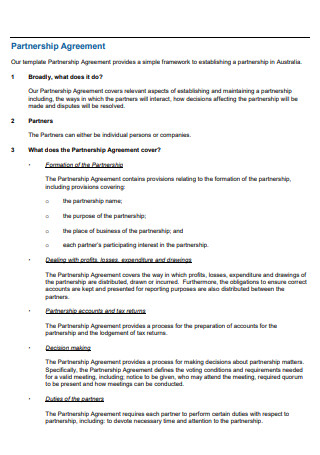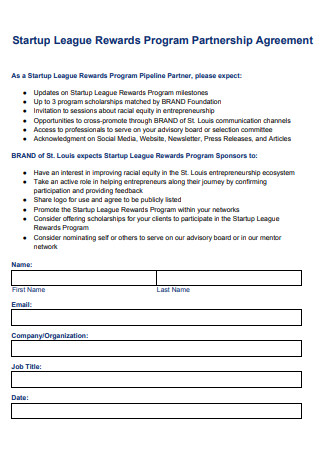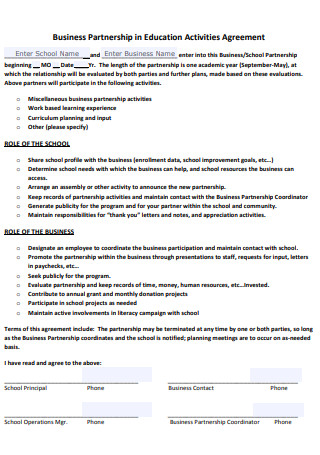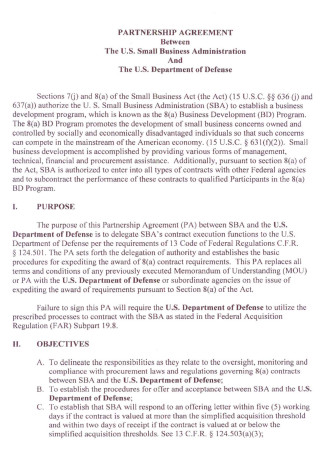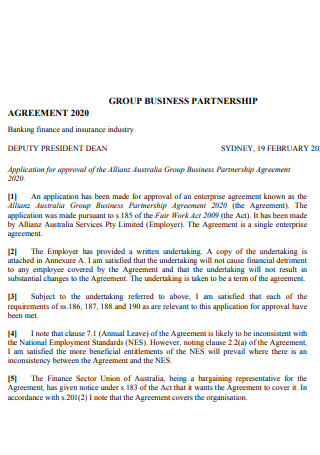4+ SAMPLE Startup Business Partnership Agreement
FREE Startup Business Partnership Agreement s to Download
4+ SAMPLE Startup Business Partnership Agreement
What Is a Startup Business Partnership Agreement?
What Is the Purpose of a Startup Business Partnership Agreement?
Significant Elements of a Partnership Agreement
Tips for Starting a Business Successfully
How to Write a Startup Business Partnership Agreement
FAQs
How can a partnership arrangement benefit your starting business?
What is a founders agreement?
What happens if there isn’t a partnership agreement in place?
What Is a Startup Business Partnership Agreement?
A startup business partnership agreement, also simply known as a startup partnership agreement, is a legal document between two or more business partners that outlines the company’s structure, each partner’s responsibilities, capital contributions, partnership property, ownership interests, decision-making formalities, the procedure for one business partner to purchase or leave the company, and how the remaining partner or partners split profits and losses. If you need an additional reference, you can make refer to and use the business partnership agreement sample available in this article. You don’t have to worry about getting lost in creating the format because we made it easy for you.
What Is the Purpose of a Startup Business Partnership Agreement?
A startup business partnership agreement is required because it sets a set of agreed-upon norms and processes that the owners must sign and accept prior to any issues arising. If any problems or disagreements emerge, the startup business partnership agreement outlines how to handle them. In other words, if things go wrong, a startup business partnership agreement protects all partners. The partners are on a level playing field formed by consensus and backed by law if they agree on a defined set of rules and values at the start of a partnership. This document is unique because it requires more attention than a business that has been afloat for years.
Significant Elements of a Partnership Agreement
A startup business partnership agreement’s goal is to control the company in the event that one of the partners leaves the partnership, decides to transfer their share to another person, or dies. It also serves to establish the partners’ rights and responsibilities, as well as to protect against unforeseen events, and include financing and asset value data. This curated list from Forbes will state the critical components to include in the established partnership agreements are outlined below. Keep these elements in mind as you write your partner agreement startup. Remember that a sample partnership deed is available when you are ready.
Tips for Starting a Business Successfully
Although it is a given that partners will play an important role in the start-up of your organization, you will need additional reminders. This compiled list will assist you in learning what you need to know as a new business owner. To start a business, you need more than just a solid idea. To reach their goals, successful entrepreneurs must first assess the market, plan realistically, then rally their soldiers. In practice, vision is only one part of the issue; knowing how to deal with specific challenges and being able to market yourself in a competitive context are equally vital.
How to Write a Startup Business Partnership Agreement
Startups can be tricky when you work with a partner. When things start to take off, it’s critical to have a clear understanding of each person’s roles and the structure of the relationships in order to avoid misunderstandings and conflicts, which may be costly and cause you to lose control of your company. A well-written contract is the bedrock of a successful startup partnership arrangement. Make certain you include all pertinent information. Don’t worry because you won’t have to start from scratch while writing the startup partner agreement, proceed to check out the agreement format this article has prepared ahead.
Step 1: Name of the Partnership or Startup
One of the first steps is to come up with a name for your partnership. You have the option of using your own last name or adopting and registering a fictional business name. If you are going to use a fictitious name, make sure it’s not already taken otherwise you might face issues with copyright infringement.
Step 2: Each Partner’s Contributions to the Startup
Before the business begins, you and your partners must figure out and document who will contribute cash, property, or services, as well as what ownership percentage each partner will have. Due to conflicts over contributions, many promising businesses have collapsed. Discuss whether or not profits and losses will be given an allocated proportion to a partner’s percentage of interest in the business. You should also clarify whether or not the partner is entitled to a withdrawal of allocated profits from the business or will be distributed at the end of the year.
Step 3: Each Partner’s Authority within the Company
Although there is no magic formula or terminology for dividing up decisions among partners, trying to figure it out ahead of time will save you a lot of grief. For every business decision, you might want to require a unanimous vote of all partners. If that seems excessive, you can make big decisions demand a unanimous vote, and allow individual partners to make minor decisions on their own. In this instance, your partnership agreement must specify what constitutes a significant or small choice. When building up your business’s decision-making process, you should carefully consider challenges like these.
Step 4: New Partner Admission Process
You may want to develop your company even further and bring in new partners in the future. When this issue arises, agreeing on a method for accepting new partners will make your lives a lot easier. Both initial partners should be able to come to an understanding of the presence of welcoming a new partner into the business.
Step 5: Partner Withdrawal or Departure Procedure
The regulations for dealing with the departure of a business shareholder or partner are at least as significant as the rules for admitting new partners to the business. To deal with this potential concern, you should include a suitable buyout scheme in your partnership agreement. Be sure that both of you have come to a decision on how the arrangements will be made and what the end result will be.
FAQs
How can a partnership arrangement benefit your starting business?
A startup business partnership agreement enables you to structure your relationship with your partners in a way that is beneficial to your company. You and your partners can agree on how much of the profits or losses each partner will bear, as well as each partner’s obligations, what will happen to the business if one of you leaves, and other key rules. As mentioned in earlier lists, you need to sort various elements to determine the best outcome of the partnership.
What is a founders agreement?
A founders’ agreement is a legal document that governs a company’s founders’ commercial relationships. The agreement spells forth each founder’s rights, responsibilities, liabilities, and obligations. It governs matters not covered by the company’s operating agreement in general. If you are interested in creating this type of specific agreement, then you can start with the available samples readily made for you.
What happens if there isn’t a partnership agreement in place?
Partners are not permitted to take a wage if there is no signed partnership agreement. Instead, they split the company’s profits and losses evenly. The agreement spells out each partner’s rights, responsibilities, and obligations to the company and to one another. As can be seen in the above points, there is more to a startup business partnership agreement than what can be initially depicted of it as it is more beneficial than people think.
Starting a business already has its numerous list of challenges and dealing with your partner is definitely one that you should not take lightly. This is why having a partnership agreement for a startup is important so that both of you are able to identify the respective responsibilities and financial share each of you will handle. What are you waiting for? Don’t keep your partners and potential investors waiting and start writing now!

